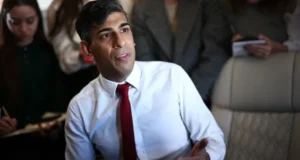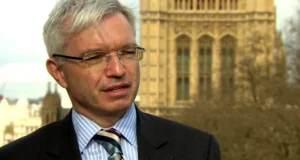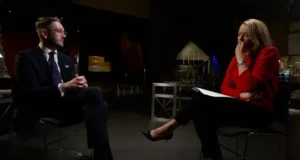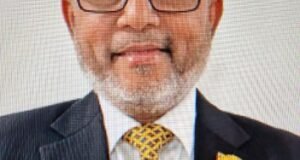 The UK’s party leaders have clashed in the first TV election debate on a range of issues including the NHS, immigration and the deficit.
The UK’s party leaders have clashed in the first TV election debate on a range of issues including the NHS, immigration and the deficit.
It is the only time David Cameron and Ed Miliband will appear together on TV ahead of 7 May’s polling day.
The Conservative and Labour leaders, as well as the leaders of the Lib Dems, UKIP, the Green Party, the SNP and Plaid Cymru, also debated zero-hours contracts, spending cuts and education in the ITV-hosted contest.
Seven million viewers watched the debate, according to ITV, which was a 31% share of the audience. There was a peak audience of 7.4 million, or 33% of the audience.
Snap polls taken after the debate gave a mixed verdict.
A YouGov poll of 1,100 people gave a clear victory to the SNP leader Nicola Sturgeon, with 28%, followed by UKIP leader Nigel Farage on 20%, Mr Cameron on 18%, Mr Miliband on 15%, Mr Clegg on 10%, Green Party leader Natalie Bennett on 5% and Plaid Cymru’s Leanne Wood on 4%.
But a ComRes poll for ITV made it a dead heat between Mr Cameron, Mr Miliband, Mr Farage and Ms Sturgeon, although Mr Cameron came out on top on the question of who was most capable of leading the country.
Mr Miliband was judged best performer in an ICM poll for the Guardian, taking 25% of support, just ahead of David Cameron on 24%.
There was no game-changer. No single “moment”, no zinger, no gaffe which looks set to re-shape the course of this election. Save perhaps for one.
That was the presence on the stage of not two or three party leaders but seven – a debate in which the talk of a new sort of politics, multi-party politics, became visible reality.
If that gives a boost for UKIP’s Nigel Farage with his laser focus on immigration and his attack on the “Westminster parties” – as the early instant polls suggest – it will worry the Tories.
If it also promotes Natalie Bennett’s Greens, Nicola Sturgeon’s SNP and Leanne Wood’s Plaid Cymru after their assault on austerity – it will frighten Labour. The consequence could be an outcome more unpredictable and more uncertain than any election for years.
Some of the sharpest exchanges in the two-hour event came when Lib Dem Nick Clegg clashed with Mr Cameron.
Mr Clegg accused Mr Cameron of wanting to cut the money going into schools – Mr Cameron denied this and accused the Lib Dem leader of taking a “pick and mix approach” to decisions they had made together in cabinet.
Mr Miliband attacked Mr Clegg for “betraying young people” over tuition fees – a clearly riled Mr Clegg attacked the Labour leader’s “pious stance” and challenged Mr Miliband to apologise to the British public for “crashing the economy”. Mr Miliband said Labour had admitted getting it wrong over bank regulation.
Ms Sturgeon took a firm line against austerity and signalled areas, such as increasing the top rate of income tax, where she could work with Labour but said getting more SNP MPs elected to Westminster was needed to “keep them honest”.
Ms Wood and Ms Bennett joined Ms Sturgeon in stressing their anti-austerity credentials.
The BBC’s assistant political editor Norman Smith told BBC Radio 4’s Today programme both Mr Cameron and Mr Miliband’s supporters were “pretty pleased” – “they felt their men came through it relatively unscathed, they got over their core message, they both believed they managed to look prime ministerial…”
However, he said, those with the most to smile about would be the smaller parties, “particularly the women, and most particularly Nicola Sturgeon”.
The SNP leader had “managed to project herself as a distinctive, articulate voice of anti-austerity in a way which we’ve not really had on the national stage”, he said.
Mr Farage, on the other hand, seemed to be appealing “again and again and again to his base, this is not a (UKIP) campaign that is reaching out”.
Mr Farage risked controversy by highlighting the number of foreign nationals with HIV whom he said were treated by the NHS, saying: “We have to look after our own people first.”
Ms Wood said Mr Farage “ought to be ashamed of himself” for deploying “scaremongering rhetoric”.
Mr Farage also clashed directly with Mr Cameron on the issue of immigration, saying he stood no chance of getting agreement from other EU leaders to restrict the free movement of people.
Mr Cameron rejected this and accused Mr Farage of wanting to get a Labour government through the “back door”.
He said: “We do need immigration that’s controlled and fair. In recent decades it’s been too high and I want to see it come down.”
Mr Farage responded: “As members of the EU, what can we do to control immigration? Let me tell you – nothing.”
It was a relatively even-tempered debate, with few examples of the leaders shouting across each other, but a woman from the audience attempted to disrupt proceedings, shouting “they are not listening to us” as Mr Cameron gave an answer on the armed forces.
The heckler, Victoria Prosser, 33, from Salford, told reporters she had challenged David Cameron because she wanted people to question “the 1% at the top” who she said were not working in the country’s interests.
Mr Miliband repeatedly described what he would do “if I am prime minister”, in raising the minimum wage, banning exploitative zero-hours contracts and “rescuing our NHS”.
Mr Clegg directly challenged Mr Cameron over his decision not to ask the richest to pay more towards deficit reduction, but instead to impose “ideologically-driven cuts”.
the battleground of Bolton West to review Thursday’s debate
Responding to Mr Cameron’s casting of the election as a choice between “competence and chaos”, the Lib Dem leader urged him to “imagine the chaos in people’s lives” caused by cuts in spending on health, schools and childcare.
Mr Cameron said the wealthy would be the target of a £5bn crackdown on tax avoidance and evasion.
He then turned the spotlight on Mr Miliband, who he said “still thinks the last Labour government didn’t tax too much, borrow too much and spend too much”.
Labour’s Ed she has a say
Ms Bennett got things under way with an anti-austerity message, saying there was an “alternative” to making the poor and disadvantaged pay for the mistakes of bankers.
Mr Farage said the other six parties were all the same because they supported EU membership, adding he wanted to “take back control of our borders”.
Mr Clegg said no-one would win the election and voters should think about who they want to see in coalition, saying his party offered “grit” in government.
Ms Sturgeon had a message of “friendship” for the rest of the UK, saying the SNP would work with other “parties of like mind” to end the “bedroom tax” and protect the NHS.
Mr Miliband said Labour had a better plan for the country and vowed to ban exploitative “zero-hours” contracts and “save” the NHS.
Mr Cameron said the Conservatives’ economic plan was working, adding: “Let’s not go back to square one, Britain can do so much better than that.”
Ms Wood had an anti-austerity message and said her party can “win for Wales” in a hung Parliament.
Amid suggestions of a hung Parliament and possible coalitions and deals after the election, commentators have said that the debates made the British political system look very different from the traditional two or three-party set-up.
But Conservative Chief Whip Michael Gove said he would prefer a majority government with David Cameron at the helm, and there were dangers in a “patchwork quilt coalition”.
And shadow energy secretary Caroline Flint said: “At the end of this campaign it’s about a choice: who’s going to be the prime minister? And that’s between Ed Miliband and David Cameron.”
The seven-way debate emerged from tortuous negotiations between the parties and the broadcasters, with Mr Cameron refusing a direct head-to-head with Mr Miliband.
The Democratic Unionist Party, which has eight MPs, has criticised its exclusion from the programme.
Host
A question-and-answer programme featuring Mr Cameron and Mr Miliband appearing separately was hosted by Channel 4 and Sky News last week, and a BBC debate involving opposition party leaders, moderated by David Dimbleby, will be broadcast on 16 April.
There will also be a special Question Time on BBC One, a week before polling day, with Mr Cameron, Mr Miliband and Mr Clegg appearing one after the other to answer questions from a studio audience.
 Weekly Bangla Mirror | Bangla Mirror, Bangladeshi news in UK, bangla mirror news
Weekly Bangla Mirror | Bangla Mirror, Bangladeshi news in UK, bangla mirror news






